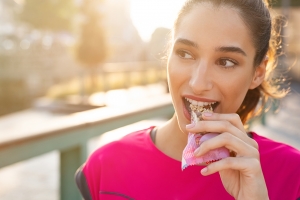IBS (Irritable Bowel Syndrome) is the most commonly diagnosed condition by gastroenterologists worldwide with a prevalence of 11%. IBS is often given as a diagnosis when other conditions of the gastrointestinal tract – Inflammatory Bowel Disease (IBD), Coeliac Disease and bowel cancer – have been ruled out, but symptoms have been going on for a long time and persist (at least 6 months). Here are 6 tips to help improve your IBS symptoms.

1. Keep a food & symptom diary
Even if just for a short time this can be a helpful tool to track any patterns with the food we eat and our symptoms. What can also be extremely helpful is to also note down other factors including lifestyle factors (stress, sleep, menstrual cycle, etc.) that might be contributing to our symptoms then we can see if we notice any patterns. It doesn’t have to be extensive, even just quick notes in your phone will do.
2. Do not exclude food groups or follow restrictive diets
Do not exclude food groups or follow restrictive diets without first consulting a registered nutrition professional – There is so much information out there at the moment on different diets that claim to ‘cure’ IBS type symptoms but please do not embark on any kind of restrictive eating pattern without seeking proper advice first as to whether it is right for you. Firstly, excluding food groups without proper guidance could lead to nutrient deficiencies, and secondly, following a diet like the Low FODMAP diet for a long period of time, without proper supervision around reintroduction of foods, can actually have negative impacts on the diversity of microbes (reduced bifidobacterium species) and gut health in the long term.

3. Take a look at the quality of your diet
If you eat a lot of processed foods with additives or low sugar sweetened foods this may be having an impact on your symptoms. Not only do processed foods sometimes have less fibre, and adequate fibre is vital for digestive health, but the other ingredients used may cause bloating like polyols (erythritol, hydrogenated starch hydrolysates, isomalt, lactitol, maltitol, mannitol, sorbitol and xylitol) in some low sugar snack bars. See where you can swap processed foods for more whole foods.
4. Fibre
We should be having around 30g per day of fibre but on average, in the UK, we only get around 17-18g. We get fibre from foods like wholegrains, fruit, vegetables, nuts, seeds and legumes. Fibre is so important to keep our bowels moving, to feed our gut bacteria and its also important for a healthy heart and maintaining a healthy weight. Aiming to have at least 5-7 portions of fruit and vegetables per day (e.g. 5 veg and 2 fruit) can help us to increase our fibre intake. Swapping refined grains (white bread, white pasta etc) for wholegrains can also help, as can adding beans, pulses and lentils to our dishes. It is important we increase fibre slowly rather than going from very little to lots very quickly to avoid unwanted side effects (bloating and flatulence) so try increasing the amount over a few weeks. NB: There are some people who suffer with IBS and digestive problems who find fibre worsens symptoms, particularly certain types of fibres found in foods like onions and garlic. If this is you it’s important to get proper help and guidance from a qualified nutrition professional.

5. Chewing
This might seem like an obvious one but you’d be surprised at how many of us don’t chew our food properly, particularly when we are not eating mindfully. Try chewing each mouthful for 20-30 chews. Although simple, this tip can make a huge difference. Chewing not only mechanically breaks down our food, it also enables enzymes in our saliva to be mixed with the food to help break it down. Chewing also helps signal the stomach and pancreas that food is coming so they release acid and enzymes respectively to further break down our food so it is ready to enter our small intestine where nutrients are absorbed.
6. Get help
If you are struggling with your digestive symptoms and IBS, please don’t suffer in silence – get help from a nutrition professional. There is so much we can do to help. Health can never be a one size fits all and what works for one of us may not work for another but seeing someone will help you find the best way forward for you personally. I see so many people who wish they had got help earlier and not lived for years suffering in silence, don’t let that be you too!
Clemmie is a Qualified Nutritional Therapist and founder of The NALM Clinic. She specialises in helping to improve the quality of life of people with IBS and IBD. You can watch her IGTV video to learn more about IBS below.
View this post on Instagram
About Clemmie Oliver



Leave a Comment: